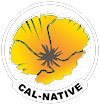
Sambucus mexicana
Blue Elderberry

Description
The blue elderberry is a winter-deciduous shrub that can reach heights greater than 25 feet but typically pruned to 20' tall and 10-20' wide. It may be considered a small tree, except that it rarely has only a single trunk, a feature that many botanists use to help define the unclear distinction between shrubs and trees. Blue elderberry grows throughout western North America along streams and also in drier habitats such as coastal scrub, chaparral, and forest openings. In spring, it produces flat-topped clusters of many cream-colored flowers. These are followed by bunches of dark blue, wax-covered berries during summer. The fruit, which are attractive to birds, can be used for making pie, jelly, and wine. All parts of this plant are poisonous except the flowers and berries. Leaves are light green color. Bark may be dark or light gray and fissured. It does best in full sun with sandy, acidic soil. It does not tolerate coastal conditions.
Plant Type
Tree, Shrub
Height Range
12-25'
Width Range
12-25'
Flower Color
Yellow, White
Flower Season
Spring
Leaf Color
Light Green
Bark Color
Grey
Fruit Color
Blue
Fruit Season
Summer
Sun
Full
Water
Low
Growth Rate
Fast
Soil Type
Sandy
Soil Condition
Average, Poor, Well-drained, Dry
Soil pH
Acid, Neutral
Adverse Factors
Attracts Bees, Poisonous
Design Styles
Mediterranean, Ranch, Spanish, Wild Garden
Accenting Features
Multi-trunk Tree, Showy Flowers, Specimen
Seasonal Interest
Spring, Summer, Fall
Location Uses
Background, Lawn, Park, Walls / Fences
Special Uses
Erosion Control, Shade Tree
Attracts Wildlife
Birds
Water Saving Tip:
Check the soil's moisture level before watering.
You can reduce your water use 20-50% by regularly checking the soil before watering.